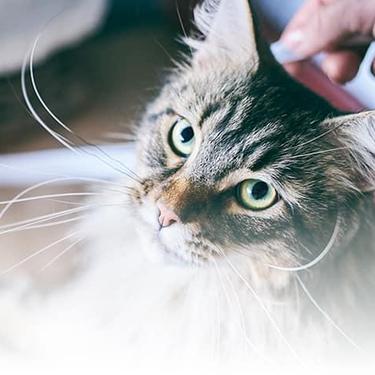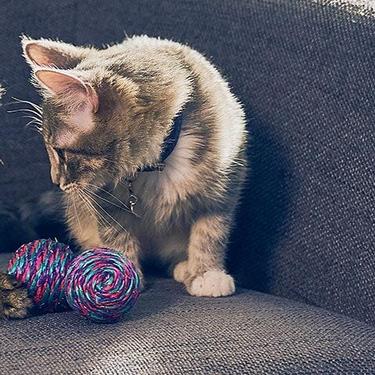
-
Find the right food for your petTake this quiz to see which food may be the best for your furry friend.Find the right food for your petTake this quiz to see which food may be the best for your furry friend.Featured products
 Sensitive Stomach & Skin Dog Food
Sensitive Stomach & Skin Dog FoodHill's Science Plan Sensitive Stomach & Skin Adult Wet Dog Food with Chicken is a complete premium dog food for adult dogs from 1 year. This savoury tinned loaf is enriched with ingredients that support digestive health & skin care.
Shop Now Perfect Weight Small & Mini Adult Dog Food
Perfect Weight Small & Mini Adult Dog FoodHill's Science Plan Adult Small & Mini Dog Food with Turkey is a complete premium pet food for adult small dogs from 1 year old that are prone to weight gain or slightly overweight. This deliciously smooth mousse is formulated to deliver the appropriate amount of energy to support weight maintenance in adult dogs.
Shop Now Perfect Digestion Small & Mini Adult Dog Food
Perfect Digestion Small & Mini Adult Dog FoodHill's Science Plan Perfect Digestion Small & Mini Adult Dog Food with Turkey is a complete premium pet food for small breed adult dogs aged 1–6 years. This deliciously smooth mousse is precisely balanced to deliver the appropriate amount of energy and to support digestive health in adult, small breed dogs.
Shop NowFeatured products Mature Adult Wet Cat Food with Chicken
Mature Adult Wet Cat Food with Chicken
Tender chicken chunks in gravy for mature adult cats. Made with easy-to-digest ingredients, high-quality protein for lean muscle maintenance and antioxidant vitamins C+E for optimal health.
Shop Now Light Adult Multipack Wet Cat Food with Chicken & Ocean Fish
Light Adult Multipack Wet Cat Food with Chicken & Ocean FishTender chicken chunks in gravy for cats, with L-carnitine and fewer calories for ideal weight management. Packed with high-quality protein, omega-6s, and vitamin E for shiny fur and healthy skin.
Shop Now Adult Multipack Wet Cat Food with Beef, Ocean Fish & Chicken
Adult Multipack Wet Cat Food with Beef, Ocean Fish & ChickenTender chunks in gravy for cats, with high-quality protein to maintain lean muscle. With vitamin E and omega-3s & -6s for healthy skin and balanced minerals to support healthy vital organs.
Shop Now -
Dog
- Dog Tips & Articles
-
Health Category
- Weight
- Food & Environmental Sensitivities
- Urinary
- Digestive
- Joint
- Kidney
-
Life Stage
- Puppy Nutrition
- Adult Nutrition
- Senior Nutrition
Cat- Cat Tips & Articles
-
Health Category
- Weight
- Skin & Food Sensitivities
- Urinary
- Digestive
- Kidney
-
Life Stage
- Kitten Nutrition
- Adult Nutrition
Featured articles Show some love with wet foods: a great choice for pets with health issues
Show some love with wet foods: a great choice for pets with health issuesShow some love with wet foods: a great choice for pets with health issues.
Read More The Incredible Science Behind Your Pet's Microbiome
The Incredible Science Behind Your Pet's MicrobiomeLearn what your pet's microbiome is, how it contributes to your pet's gut and overall health, and why nutrition is important in maintaining healthy microbiomes.
Read More The Right Diet For Your Pet
The Right Diet For Your PetIn people, the right diet is very important. If you are eating the wrong way for your metabolism, activity level, age and lifestyle you could end up with health issues.
Read More -



Have you ever turned the sound off while watching a scary film? Lots of people do, and with good reason. We’ve evolved in a scary world where unexpected, loud noises make us jump. The reason for this is that virtually all animals, including humans, are hunted by something else. Even predators like cats are prey animals too. We, and they, have evolved to have a fight or flight response to danger, and loud, sudden noises present a potential danger to all of us. Lots of animals are frightened by sounds like fireworks and thunder and, while it’s completely normal, it can be distressing to see your cat cowering and shaking every time a storm rolls in.
Signs of fear in cats
Cats live in a 3D world. They love to be off the ground and be able to escape at all times, so a cat’s first response to anything that frightens them is to go high or hide. Most of their predators can’t climb as well as they can and scary noises that are unknown will make them want to escape somewhere they feel hidden, be that on top of a wardrobe or under a bed or a duvet. Other signs of fear are;
Trembling or shaking
Vocalising
Salivating or drooling
Panting
Not wanting to eat.


Tasty Tips
What should you do if your cat is frightened?
Firstly, act normally. Your cat will definitely sense if you are feeling anxious, so try to stay as calm as possible. Other than this, the most important things are;
Keep them inside if you can. If you know there are going to be fireworks or a storm, try to keep your cat in so they don’t bolt and get lost or hurt.
Try to soften the noises and light flashes. Whether storm or fireworks, there will be bright flashes and intermittent loud noise. Close all the curtains or blinds and put some gentle music on at a moderate volume to try to block out the extraneous noise and lights.
Let your cat hide. Make sure there are plenty of places they can go and let them decide. Leave as many internal doors open as possible, with access to places you are happy for them to go. Some cats will go under the bed, some under the duvet, while others will want to get as high as they can to wait it out. The more freedom of choice they have, the more relaxed and safe they will feel.
Don’t hug them. Humans are social animals who find a lot of comfort in physical contact. Cats find being restrained, especially when they are feeling threatened, incredibly stressful. They need to feel they can flee at any moment. So, while you may feel like giving your cat a cuddle or picking them up will help them, it almost certainly will heighten their tension.
Use plugin pheromones. Pheromones make cats feel secure and safe. These can be brilliant for lots of cats in any number of anxious situations.
Provide home comforts. If you know your cat has a favourite hiding place, make sure there is food, water and a litter tray nearby. Don’t put the litter tray by the food and water. Your cat will almost certainly not want to eat while scared but they should always have access if they want to. Unwanted soiling from fear may be avoided by giving your cat a litter tray if they are too frightened or unable to go outside.
Try to play games. This is a tricky one because if your cat is terrified, trying to play games with them might just give them negative associations. However, if your cat is just a little edgy, sometimes playing a game like chasing a toy can be a great diversion and help them feel more relaxed. It also reinforces the fact that you are relaxed.
Get ahead of the game…
Preventing cat stress
The above list are all good things to do if you have a frightened cat but as always, prevention is better than cure. If at all possible, pick a kitten from parents that are not stressed or worried cats. Quiz the breeder or adoption centre about what experiences the kitten or cat has had and what their temperament is like. Talk to your vet about habituation to noise so that your cat hopefully grows up without severe anxieties or phobias. If you do have a sensitive cat, talk to your vet or a qualified behaviourist about desensitisation. This needs to be done well ahead of firework or storm season, it needs to be gradual and it needs to be done with patience and supervision.
Fear is a normal part of life. Don’t worry too much if your cat is frightened, it’s a totally normal and necessary response. However, hopefully, if you have a cat that is overly anxious this will give you some pointers as to how to alleviate that fear and distress and make you both feel more relaxed in the future.


One of our staff authors prepared this article for you
Related products

Tender chicken chunks in gravy for cats, with L-carnitine and fewer calories for ideal weight management. Packed with high-quality protein, omega-6s, and vitamin E for shiny fur and healthy skin.

Tender chunks in gravy for cats, with high-quality protein to maintain lean muscle. With vitamin E and omega-3s & -6s for healthy skin and balanced minerals to support healthy vital organs.


Tender chicken chunks in gravy for mature adult cats. Made with easy-to-digest ingredients, high-quality protein for lean muscle maintenance and antioxidant vitamins C+E for optimal health.
Related articles

Learn how to make homemade cat treats that are healthy for your pet with this recipe from Hills Pet Nutrition.

There are three common ways to feed a cat. Each way has its advantages and disadvantages.

From essential vitamins & minerals to different types of meat, learn what to look for when choosing the best cat food for your feline.

Kittens grow a lot in their first year, so it is important to provide them with the proper nutrients early, so they grow up healthy and strong. Learn more.

Put your cat on a diet without them knowing
Our low calorie formula helps you control your cat's weight. It's packed with high-quality protein for building lean muscles, and made with purposeful ingredients for a flavourful, nutritious meal. Clinically proven antioxidants, Vitamin C+E, help promote a healthy immune system.
Put your cat on a diet without them knowing
Our low calorie formula helps you control your cat's weight. It's packed with high-quality protein for building lean muscles, and made with purposeful ingredients for a flavourful, nutritious meal. Clinically proven antioxidants, Vitamin C+E, help promote a healthy immune system.

